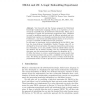Free Online Productivity Tools
i2Speak
i2Symbol
i2OCR
iTex2Img
iWeb2Print
iWeb2Shot
i2Type
iPdf2Split
iPdf2Merge
i2Bopomofo
i2Arabic
i2Style
i2Image
i2PDF
iLatex2Rtf
Sci2ools
102
click to vote
BIRTHDAY
2010
Springer
2010
Springer
DKAL and Z3: A Logic Embedding Experiment
Yuri Gurevich and Itay Neeman proposed the Distributed Knowledge Authorization Language, DKAL, as an expressive, yet very succinctly expressible logic for distributed authorization. DKAL uses a combination of modal and intuitionistic propositional logic. Modalities are used for qualifying assertions made by different principals and intuitionistic logic captures very elegantly assertions about basic information. Furthermore, a non-trivial and useful fragment known as the primal infon logic is amenable to efficient linear-time saturation. In this paper we experiment with an embedding of the full DKAL logic into the state-of-the-art Satisfiability Modulo Theories solver Z3 codeveloped by the second author. Z3 supports classical first-order semantics of formulas, so it is not possible to directly embed DKAL into Z3. We therefore use an indirect encoding. The one experimented with in this paper uses the instantiation-based support for quantifiers in Z3. Z3 offers the feature to return a pot...
Applied Computing | BIRTHDAY 2010 | Intuitionistic Logic Captures | Intuitionistic Propositional Logic | Primal Infon Logic |
| Added | 08 Nov 2010 |
| Updated | 08 Nov 2010 |
| Type | Conference |
| Year | 2010 |
| Where | BIRTHDAY |
| Authors | Sergio Mera, Nikolaj Bjørner |
Comments (0)

